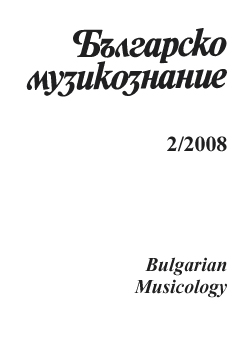Анда Палиева: „Homo musicus между Балканите и Европа. Интенции и прояви на наднационалното в българското композиторско съзнание“
Anda Palieva: Homo Musicus Between the Balkans and Europe. Intentions and Appearances of the Supra-National in the Bulgarian Compositional...
Author(s): Rumyana KarakostovaSubject(s): Music
Published by: Институт за изследване на изкуствата, Българска академия на науките
Summary/Abstract: Anda Palieva: Homo Musicus Between the Balkans and Europe. Intentions and Appearances of the Supra-National in the Bulgarian Compositional Consciousness Anticipating the real state of Bulgarian musical culture after the country’s accession to the European Union, Anda Palieva’s book Homo Musicus Between the Balkans and Europe critically examines a wide range of actual musicological problems, established national idioms and evaluation criteria with polemical historical transferability in the context of many years of personal observations and grounded cultural theses. In relation to the key metaphor Homo musicus (understood as a sonic-creative mental attitude), projections of various analytical discourses build up every subsequent level of the harmonious composition of the research, in which the basic structuring impulse is the idea of a contemporary rethinking of “spiritual processes in terms of the holistic logic of their natural evolution as a synthesis of national and supra-national intentions within the creative consciousness”. The goal the author has set for herself is “to examine the European aspects of compositional work as a consequential line,” and to make sense of Bulgarian compositional achievements that have become part of the European musical tradition “not as individual artifacts, but as a single constant tendency in Bulgarian musical culture in the 20th century,” which undoubtedly represents an innovative approach in contemporary Bulgarian musical historiography. The thematic sphere primarily problematized in Chapter Two (“Homo Musicus Between Global Tendencies and National Traditions - Directions and Appearances of the Bulgarian Musical Avant-Garde”) immanently reflects Anda Palieva’s research interests – resulting not only from long years of musicological practice, but also from her role as initiator of Bulgaria’s first “Experimental Studio for Contemporary Music” (1982–1984), which provided additional documentary value to her research work as a direct participant in the events being analyzed. In the category of the “protesting artist” the author includes “that generation of composers born between the two World Wars” and above all emblematic figures such as Lazar Nikolov and Konstantin Iliev, to whose ranks Vasil Kazandzhiev, Ivan Spasov, Georgi Tutev and Simeon Pironkoff were subsequently added. With their radical ideas and experiments, which opposed the official (ideologized) aesthetic doctrine, they legitimize themselves as a musical avant-garde, which emphasized a qualitatively new “decisive moment in the history of Bulgarian musical works”. Anda Palieva’s classifi cation of clear examples of various individual approaches to national idioms categorically demonstrates the radical change that occurred in associative gestures toward the folklore tradition, historical memory and the “inalienably Bulgarian” in our national culture, which led to the appearance of new compositional conceptions, unique genres and...
Journal: Българско музикознание
- Issue Year: 2008
- Issue No: 2
- Page Range: 151-155
- Page Count: 5
- Language: Bulgarian
- Content File-PDF

